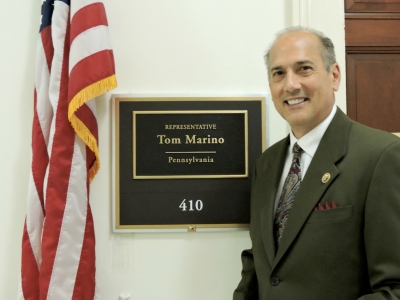
Advocates Opposed Marino and Urge Trump to Nominate Candidate Who Will Prioritize Public Health Instead of Criminal Punishment
Washington, DC—(ENEWSPF)—October 17, 2017
Today, U.S. Representative Tom Marino (R-PA) withdrew his name from consideration to become the Trump administration’s drug czar following revelations from a Washington Post/60 Minutes investigation that Marino spearheaded passage of a law that limits the ability of the Drug Enforcement Administration to crack down on opioid drug distributors. Marino was nominated to be director of the Office of National Drug Control Policy, or “drug czar,” despite having no background in health or treatment.
“The Trump administration has escalated the war on drugs, ignoring overwhelming evidence that it’s deeply unpopular and staggeringly counterproductive,” said Grant Smith, deputy director of national affairs with the Drug Policy Alliance. “The next drug czar should resist failed drug war tactics and instead prioritize health-based interventions that reduce drug related harm and save lives.”
Advocates were deeply concerned about the prospect of Marino as drug czar given that his disturbing record on drug policy is out of step both with science and with public opinion. His record included voting against the Rohrabacher-Farr amendment in Congress, which prohibits the Department of Justice from undermining state medical marijuana laws. Marino also called for the forced hospitalization inside prisons of people caught possessing marijuana or other drugs. As a U.S. Attorney, Marino showed preferential treatment for a friend convicted of cocaine offenses, while showing little mercy for others caught up in the criminal justice system.
Advocates are urging President Trump to nominate as the next drug czar a candidate who supports treating problematic drug use as a health issue and who will commit to prioritizing health-based drug policies such as ramping up access to medication-assisted treatment and supporting efforts by states to reduce criminalization and stigma of people who use and sell drugs.
Trump’s attempt to confirm Marino as drug czar was the latest in a series of steps by the Trump administration to escalate its commitment to hardline drug enforcement tactics and rhetoric. Attorney General Jeff Sessions has repeatedly dismissed the value of treatment and pursued a hardline agenda that has escalated the war on drugs. President Trump recently said that he favored “strong law enforcement” and a “Just Say No” type approach to drug prevention and education. Trump’s inaugural budget to Congress this year proposed to boost funding for law enforcement while proposing dramatic cuts to Medicaid that has extended access to opioid treatment for millions of people impacted by the opioid crisis, as well as cuts to the Substance Abuse and Mental Health Services Administration (SAMHSA), the federal agency chiefly responsible for administering federal treatment grants. In April, President Trump invited President Rodrigo Duterte of the Philippines to the White House and has praised Duterte’s massacre of thousands of people suspected of using or selling drugs.
“It’s imperative for the next drug czar nominee to have strong public health credentials and a commitment to supporting drug law reform efforts at the state level,” said Smith. “The next drug czar nominee should reflect the scientific consensus that criminalizing and stigmatizing people caught with small amounts of drugs doesn’t work.”
Source: www.drugpolicy.org








